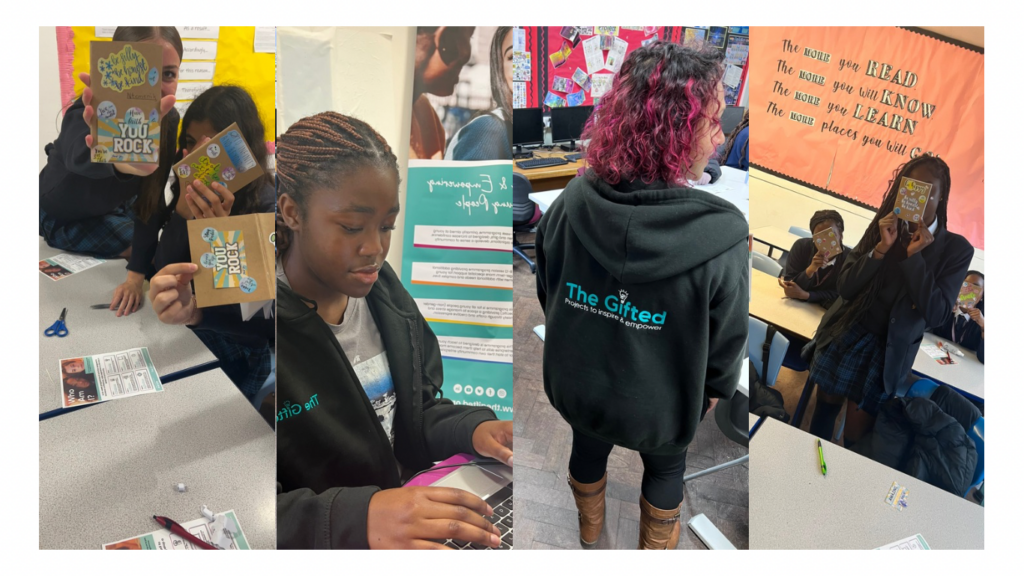Peeling back the layers of persistent disruptive behaviour
Our programmes range from after school activities, online mentoring, assemblies and The Butterfly Project (our 6-week in school programme). Early intervention programmes that are tailored specifically to girls and young women are limited and The Gifted have been filling the gap in addressing these unique needs. The Butterfly Project is preventative. We know that research indicates a strong connection between school exclusions, eligibility for free school meals (FSM) or those with a special education need (SEN) and youth violence among students, including girls. According to ChanceUK, 67% of primary school pupils who faced exclusion or suspension were eligible for FSM. In the classroom with a group of eight students none of these statistics seem to matter, as there are so many other reasons why they need this intervention. Peeling back the layers is a delicate process.
A young woman, in the middle of her GCSEs isn’t just struggling to regulate her emotions, she’s often struggling to suppress the pain. ‘If only the teachers would just ask me what’s going on instead of making assumptions’ said one of our 15 year old beneficiaries from Edmonton. We know that some girls simply don’t have the vocabulary to express their feelings or experiences, so we have coined the social media trending phrase ‘we listen, we don’t judge’. This is exactly what’s happening in our six-week Butterfly Project. We encourage our participants to talk freely and remind them that if there’s a safeguarding concern our Project Leaders will need to report it.
A 14 year old girl might express her excitement around dating a known gang member (GM). At this point the risk of coercion and exploitation is higher than we thought, potentially being forced to carry weapons, drugs, or commit crimes under the control of male gang members is happening to girls and it’s often under the radar. While girls made up 13% of proven youth offences in 2022, their role in youth violence is underreported, overlooked, or not well understood compared to boys. Girls can be victims as well as perpetrators in relation to youth violence. As Project Leaders we must be prepared for the concerning and potentially heartbreaking disclosures and take the appropriate action to safeguard girls and young people. In 2024, the High Court upheld the Headteacher’s decision to permanently exclude a boy (due to acts of sexual violence and harassment towards other students on and off the school premises). In this instance the exclusion was to safeguard other children but there is a bigger problem.
Sexual violence in schools and among young people is a serious concern. In March 2021 to 2022, the government reported the biggest rise with a 64% increase in sexual offences, on the previous year. Our focus groups with 28 girls across three Enfield secondary schools suggest that many sexual offences may still remain unreported. This is because there is limited understanding of consent, relationship abuse or violence. We educate girls on setting boundaries on the Butterfly Project and healthy relationships starts with a high sense of self worth. The Youth Endowment Fund (YEF) reports only 6% of boys and 7% of girls aged 13-17 reporting such experiences in 2023. Of the teenage children surveyed by YEF in 2024, 27% had been in a romantic relationship and 49% had experienced violent or controlling behaviour from their partner. A 2009 study by NSPCC found that 25% of girls and 18% of boys aged 13 to 17 reported experiencing physical violence from an intimate partner. A majority of young people either told a friend or no one about their experiences of abuse. It’s over 15 years later and the problem still exists. We must teach girls and young people to spot signs of abuse, control and coercion and report it.
Are schools aware of every domestic abuse incident that happens in the home? The answer is a resounding ‘NO!’. Some families have a high level of tolerance and certain abusive behaviours form a cultural norm. So when a child says, ‘I dread going home’ there’s some more layers for us to peel away. According to Bernardos, children who witness domestic abuse are at risk of both short and long term physical and mental health problems. For teenagers this can include; behavioural challenges, low school attendance, child-parent abuse, low self esteem, friendship issues, and drug or alcohol misuse. Research indicates that a significant proportion of young female offenders have histories of abuse. Approximately 63% of young female offenders aged 16 to 24 have been victims of rape and/or domestic abuse. Imagine, a child navigating her teenage years and secondary school education carrying this load while masking the trauma.
Programmes like The Butterfly Project are vital. As the name suggests, it is a slow transformation process. The Gifted work with girls to help them break out of their cocoon, but we simply do not know what we might uncover. The training and weekly supervision for our Project Leaders is an essential part of our continuous training and development. We work with people who have lived experience so some of these case studies can be triggering but, as a charity, we’re working tirelessly to peel back the layers and provide the much needed valuable insight to provide a better future for girls and young people.


